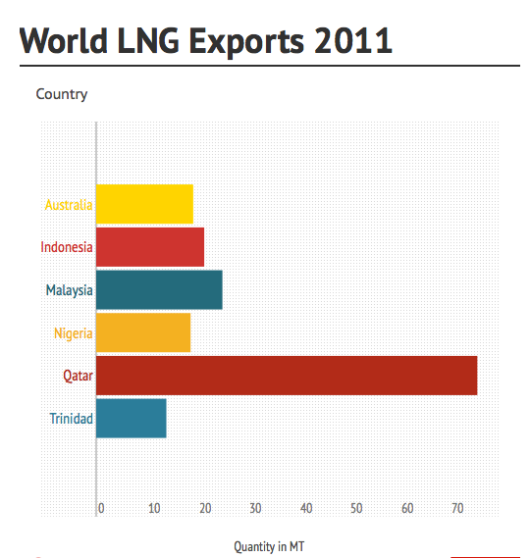LNG is the key piece in making natural gas an internationally traded commodity, without it, supply and demand of the resource would be far out of balance. Beyond this, LNG is important in the growing natural gas industry because it allows for the extraction from tough to reach reserves; it can be shipped efficiently and safely, and a has potentially great upside for exporting countries.
The largest benefit of LNG is that it opens up natural gas to world trade. Prior to the technology which allows us to transform natural gas into its liquid state, natural gas could only be distributed regionally through gas pipelines. This not only restricted the trade of natural gas, it also restricted the markets ability to grow. For instance, Australia is currently producing two times more gas than what it consumes. If it were to have no way to ship this excess over seas, the country would have no incentive to produce its maximum capacity of natural gas and their abundant supply would be a waste since it can’t get to countries who need the energy.
Top 6 exporters of LNG in 2011:
Thankfully however, we now have the ability to super cool natural gas to -162 degrees C, at which point the gas turns into its liquid state. Once in its liquid state, natural gas is 1/600 that of its gaseous volume, meaning that we can transport natural gas on tankers at and economic cost.
With the ability to ship LNG globally comes the ability to import and export natural gas. Thus, countries such as Qatar and Australia have incentive to produce as much LNG as possible for export. This benefits both the exporting countries economically and the importing countries because they now have the supply to meet their consumption, The Economist.
While LNG is the key to the international trade of natural gas, it is also important because we now have the ability to tap large natural gas reserves that were once considered inaccessible. Prior to LNG, we were unable to tap any reserves that were much more than a few miles off any coast because the amount of pipeline that had to be laid under the ocean was unfeasible. With LNG and LNG specific tankers, we are now able to pump what is extracted from these reserves directly into these ships for super cooling and transport.
By pumping extracted natural gas at sea directly onto the ships, not only are time and money being saved but the detrimental impact on the environment is being reduced. When LNG is stored, it is put under no pressure and therefore is not explosive. The ships that transport LNG are some of the most high tech on the sea with double hulls and massive amounts of insulation to prevent any sort of leak. Even though a spill is not of great fear considering the quality of these ships, the impacts of and LNG spill would be minimal in that LNG is insoluble in water and would all evaporate in a matter of minutes.
The inside membrane of a LNG tanker, Chevron:
LNG has opened the world to natural gas trade providing import opportunities for countries lacking the resource, and export opportunities for countries fortunate enough to have excess. It has allowed for the market to expand to new heights and with continued exploration by the worlds gas companies, the outlook is only bright for LNG.


